On May 1, 2025, Governor Bill Lee signed into law legislation (SB 536/HB194) that expands Tennessee’s Intercollegiate Athlete’s Name, Image, or Likeness Law (“student-athlete NIL statute”). Under the law, Tennessee student-athletes will have no limits on NIL compensation unless the limitations are expressly prohibited or limited by federal law, a valid court order, or determined to be exempt from antitrust law.
Quick Hits
- Tennessee amended its student-athlete NIL statute to allow unlimited NIL compensation for Tennessee student-athletes, unless prohibited by federal law, a valid court order, or determined to be exempt from antitrust law.
- The student-athlete NIL statute may conflict with the recent NIL compensation restrictions detailed in the approved House v. NCAA settlement.
- The amendments shield Tennessee universities from NCAA sanctions related to player pay and shift liability to the NCAA for any legal repercussions arising from student-athletes related to their pay.
Tennessee’s Student-Athlete NIL Law
In 2022, Tennessee adopted its student-athlete NIL statute, which prohibited institutions or their agents from being involved in actions that compensate student-athletes for their NIL. This included prohibiting institutions from facilitating NIL deals by working with third parties (often termed “collectives”). The law was later amended to state that an institution and its agents can be involved in NIL compensation as long as they do not coerce, compel, or interfere with the student-athlete’s decision to earn compensation.
The amendments that Governor Lee recently signed expand this law to allow unlimited NIL compensation for Tennessee student-athletes unless such limits are expressly prohibited or limited by federal law, a valid court order, or determined to be exempt from antitrust law. Tennessee institutions do not have to follow any National Collegiate Athletic Association (NCAA) rules that lessen, or tend to lessen, full and free competition in trade or commerce affecting the state of Tennessee. The recent amendments also shield Tennessee institutions and collectives from liability related to NIL compensation by shifting liability to the NCAA if the NCAA rules are deemed unlawful and by stating that the NCAA will hold the state, its institutions, and intercollegiate athletes harmless from any damages related to NIL compensation.
The Amendments’ Implications, Considering the House v. NCAA Settlement
On Friday, June 6, 2025, the U.S. District Court for the Northern District of California approved the House v. National Collegiate Athletic Association settlement that pays nearly $2.8 billion in back pay to former athletes over the next ten years. This historic settlement also establishes a revenue-sharing framework that provides a permissive cap of around $20 million for institutions to use to cover all athlete NIL compensation across varsity sports. The revenue-sharing cap is not limited to sports that generate revenue for the institution. Further, collectives that were paying NIL directly to student-athletes have other restrictions and limitations under the settlement. Particularly, NIL deals over $600 will undergo a “market value” analysis to ensure they are in direct relation to what an individual player brings to the team.
The amendments to Tennessee’s student-athlete NIL statute leave several unanswered questions in light of the approved House v. NCAA settlement. There is an open question related to whether the House v. NCAA court’s “Order Regarding Order Granting Motion for Final Approval of Settlement Agreement” would constitute a valid court order expressly limiting NIL compensation under Tennessee’s student-athlete statute. In the event it does not, Tennessee institutions and collectives may choose not to adhere to the House v. NCAA settlement’s NIL compensation restrictions under Tennessee’s Student-Athlete NIL statute.
Key Takeaways
Pursuant to Tennessee’s amended student-athlete NIL statute, Tennessee institutions and collectives are allowed to pay unlimited NIL compensation to Tennessee student-athletes. In theory, if Tennessee institutions and collectives do not comply with the House v. NCAA settlement’s restrictions on NIL compensation, they risk sanctions from the NCAA. While there is a risk of sanctions from the NCAA, under the amended student-athlete statute, Tennessee institutions and collectives may be shielded from any liability from lawsuits related to NIL compensation, and any such liability will be shifted to the NCAA.




 />i
/>i
